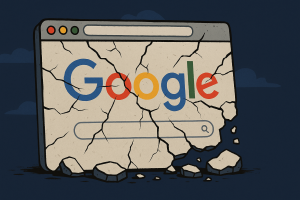 In a legal filing meant to defend its advertising empire, Google may have inadvertently said what many in the industry have long suspected: the open web is in serious decline. That’s the phrase the company used in its September 5 court response as it fights against a proposed breakup of its ad business. At stake is whether Google must divest its AdX advertising exchange—an engine that has helped it dominate online display advertising for years.
In a legal filing meant to defend its advertising empire, Google may have inadvertently said what many in the industry have long suspected: the open web is in serious decline. That’s the phrase the company used in its September 5 court response as it fights against a proposed breakup of its ad business. At stake is whether Google must divest its AdX advertising exchange—an engine that has helped it dominate online display advertising for years.
But in trying to save itself from being carved up by the Department of Justice, Google made an unexpected pivot. After years of insisting that traffic from search is strong and the web is flourishing, the company is now warning that forced divestment could speed up what it calls the “rapid decline” of the open web.
So which is it? A healthy ecosystem driving billions of dollars in value—or a fragile economy on the brink of collapse?
Google’s Shifting Narrative
Google’s line about the “rapid decline” wasn’t buried in fine print. It appeared plainly in the company’s argument against government-imposed remedies in its antitrust case. The company warned that removing its ability to run AdX could harm the web by choking off advertising revenue that thousands of websites rely on.
The Department of Justice argues that Google’s ad stack creates unfair market dominance by locking publishers and advertisers into a vertically integrated system. The court previously agreed that Google had suppressed rival technologies and manipulated auctions to favor its own platforms. What’s being decided now is how to fix the damage.
In its response, Google claimed that its integrated ad business supports what’s left of the open web. Without it, the company suggests, websites will collapse under the weight of declining ad revenues and the rise of closed ecosystems like connected TV, retail media, and social platforms.
Web Traffic or Window Dressing?
There’s a problem with this argument. Publicly, Google continues to say that the web is doing just fine—especially when questions arise about whether its AI Overviews are draining clicks from actual websites. In those moments, Google insists that referrals to websites are “relatively stable” and that AI-enhanced search isn’t reducing traffic to the broader web.
But researchers, including those at Pew, have observed a noticeable dip in web traffic linked to AI-driven results. And many publishers have felt the impact. So when Google suddenly argues in court that the open web is “already” in decline, eyebrows go up.
When asked about the apparent contradiction, a Google spokesperson said the court statement was specifically about open-web advertising, not the web as a whole. That may be a fair clarification, but it’s also a distinction that might not matter. If open-web advertising is dying, the open web may not be far behind.
The Economics of Attention
Here’s the real problem: ads on the open web don’t earn what they used to. While Google’s earnings are at record highs, the money is coming from elsewhere—mobile apps, YouTube, and other tightly controlled environments where Google gets a bigger cut of the pie.
Meanwhile, engagement with traditional websites—especially those focused on written content—is either flat or declining. As Google’s own filings confirm, in-app ads now represent the largest growth area for the company. That shift means it has less incentive to steer users toward publishers running display ads and more reason to keep them inside AI experiences or Google-owned platforms.
Google has long argued that more websites are being indexed than ever before. It even claims a 45 percent increase in crawlable content since 2023. But that figure may not mean what it seems to. Much of the new content could be low-quality material generated by AI, often called “AI slop,” created to game search engines without offering much value to human readers.
The Bigger Picture
If the web is growing in quantity but shrinking in economic sustainability, what does that say about its health? If ad revenues can’t support journalism, expert blogs, niche communities, or educational resources, then who is the open web actually for?
Google’s court admission may be less about legal strategy and more about confronting a reality that’s been years in the making. Advertising made the web viable, but as money flows elsewhere and AI begins to crowd out human content, the model is cracking.
It’s possible that we’re approaching a turning point—one where a handful of companies control not only how we access information but also what content gets created in the first place.
If the open web really is in “rapid decline,” Google may not be the only one to blame. But it certainly played a central role in getting us here.